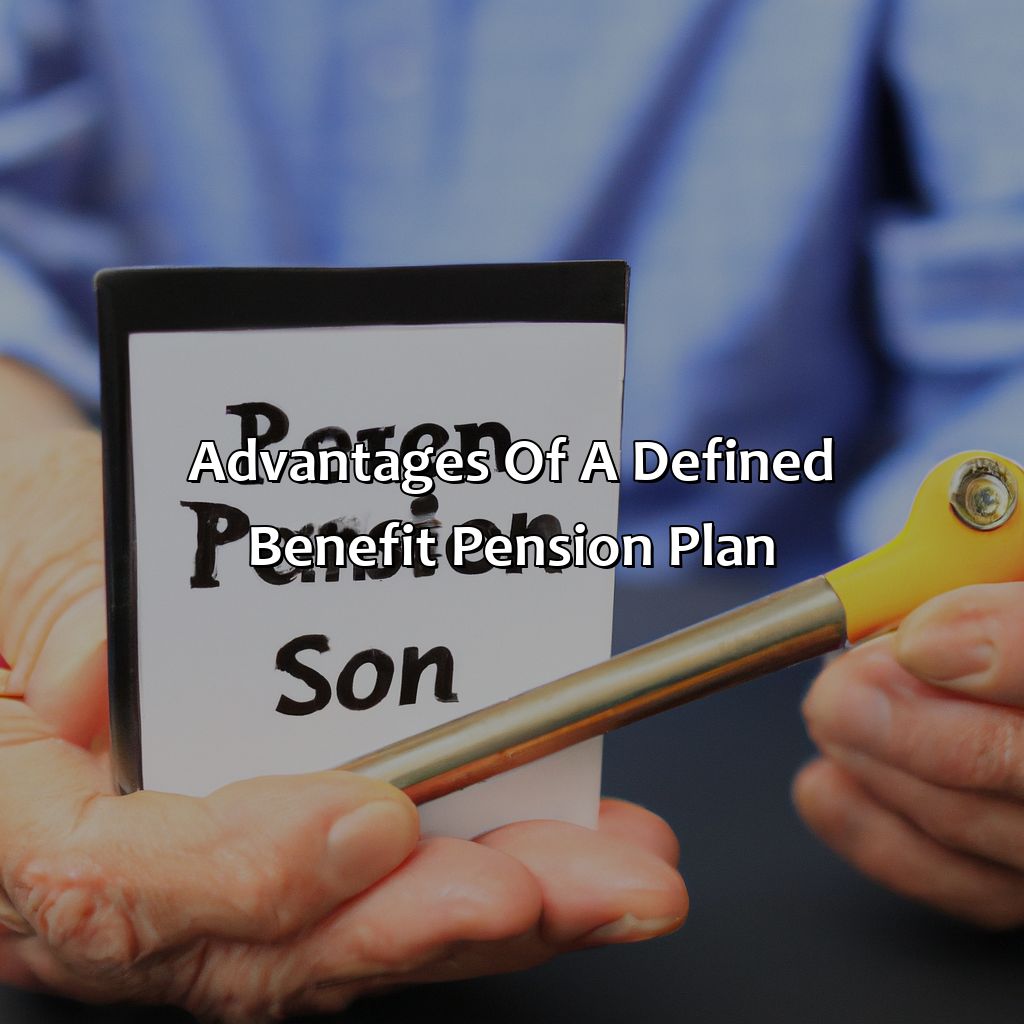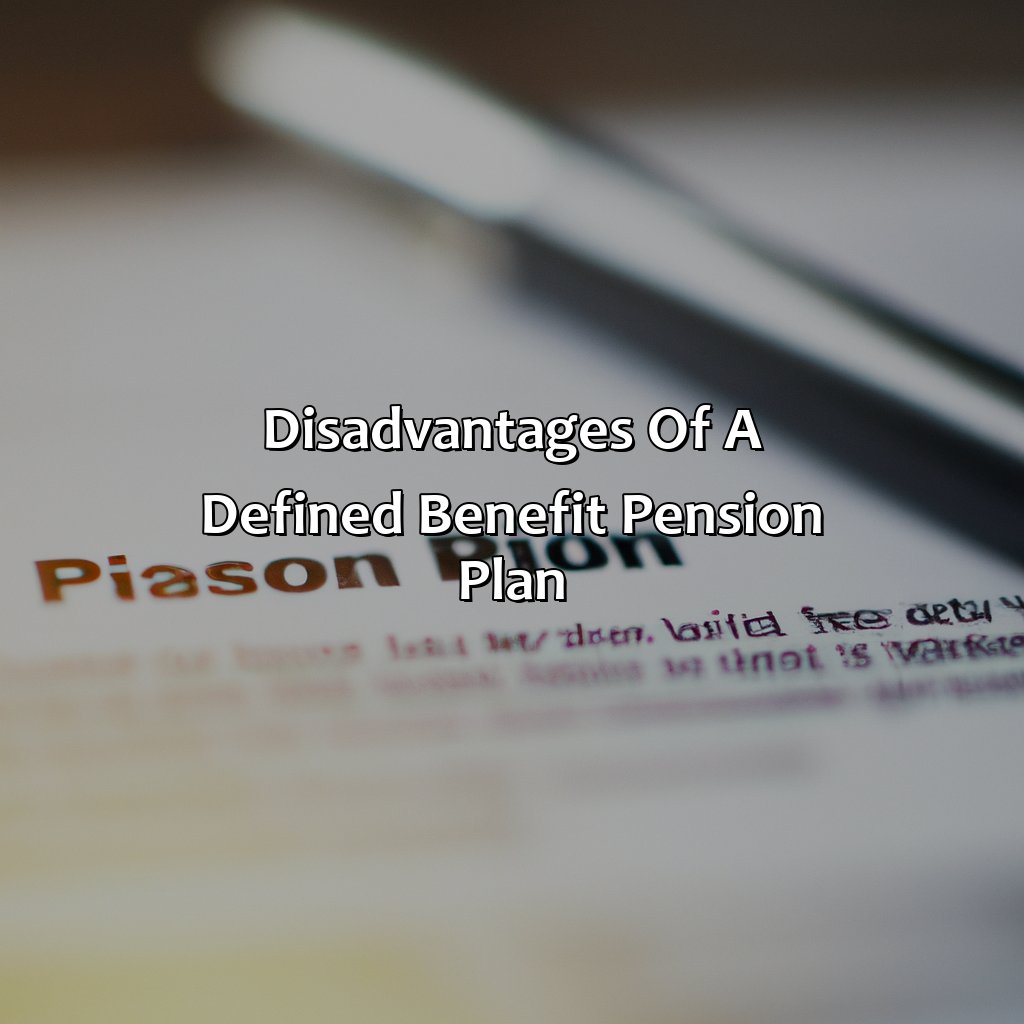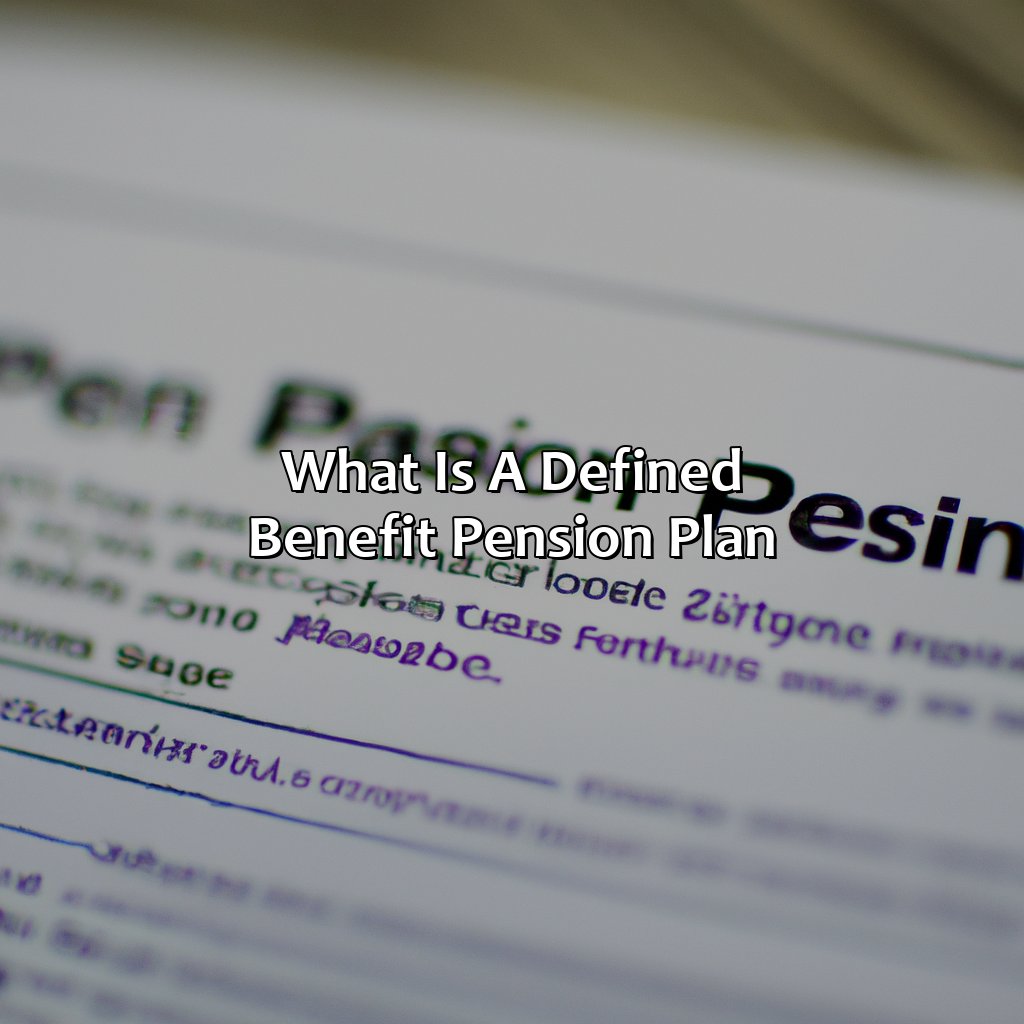What Is A Defined Benefit Pension Plan?
Key Takeaway:
- A defined benefit pension plan is a retirement plan that guarantees a specific amount of income for life, based on an employee’s salary and years of service. This type of plan is primarily funded by employers, but employees may also contribute.
- One of the main advantages of a defined benefit pension plan is that it provides a guaranteed income for life, which can help retirees maintain a stable standard of living. Employers also contribute to the plan, which can reduce the burden on employees to save enough for retirement.
- However, defined benefit pension plans also have some disadvantages, including lack of flexibility, risk to employers, and funding shortfalls. These plans may not be suitable for employees who value flexibility and autonomy in their retirement planning, or for employers who are concerned about the financial risks of managing a pension plan.
Are you unsure of what a defined benefit pension plan is and how it can help you achieve financial security? This article will provide you with an understanding of the advantages of having a defined benefit pension plan so you can make the right decisions for your future.
What is a Defined Benefit Pension Plan?
Let’s explore the concept of a defined benefit pension plan! We’ll split it into three areas:
- Definition and Explanation
- How it Works
- Types of Defined Benefit Pension Plans
Firstly, we’ll define what’s meant by a defined benefit plan. Secondly, we’ll show how these plans operate. Lastly, we’ll list the different types of defined benefit pension plans.

Image credits: retiregenz.com by Yuval Woodhock
Definition and Explanation
Defined Benefit Pension Plan- A Comprehensive Outlook
A Defined Benefit Pension Plan entails an employer-specific retirement plan, wherein the amount of monthly benefit is predetermined based on various factors such as salary history, age and duration of employment.
These plans differ from Defined Contribution Pension Plans, where the employee contribution and investment returns determine the retirement benefits.
In a DB pension, the employer bears the risk and promises to pay a specific amount that is guaranteed to vested employees upon retirement. These plans have set formulas and are maintained by actuaries for optimal fund management.
Interestingly, some companies such as IBM are moving away from these traditional pension plans due to their high costs. As a result, newer employees are offered 401(k) plans which place the financial burden on them instead of the company.
Evidently, there is much to consider when opting for a Defined Benefit Pension Plan and it may be advantageous or disadvantageous depending on one’s circumstances.
Why save for retirement when you can just rely on a defined benefit pension plan to fund your golden years? Just sit back, relax, and let HR take care of it.
How it Works
A Defined Benefit Pension Plan provides employees with a specific amount of retirement income, regardless of market fluctuations or contributions. The employer is responsible for funding and maintaining the plan, ensuring that retirees receive their benefits. This plan typically factors in various personal details such as age and years of service to calculate the pension amount.
The benefits received from this plan depend on how long an employee has worked for the employer, their average salary, and other relevant factors. Employers often invest these funds to generate returns that offset future obligations. Moreover, employees don’t have to make investments as it is entirely funded by their employers.
A unique feature of defined benefit plans is that employers must ensure full funding for all pension liabilities accrued each year. Thus, in some cases, annual contribution amounts might change depending on how well the investments are performing.
Pro Tip: Employers must manage pension risks effectively using tools such as liability-driven investment strategies.
The different types of defined benefit pension plans are like flavors of ice cream – some people prefer vanilla, while others go for the more exotic options like rocky road or mint chocolate chip.
Types of Defined Benefit Pension Plans
For individuals planning for retirement, understanding the various types of defined benefit pension plans can be crucial. These plans provide consistent payouts to retired employees based on a formula using factors such as years of service and salary history. Below is a breakdown of the different types of defined benefit pension plans:
- Single-Employer Plans: These are sponsored by individual companies and can either be fully funded by the employer or jointly funded by both the employer and employee.
- Multiemployer Plans: Multiple employers collaborate to establish these plans, with each contributing towards a single fund that pays pension benefits to eligible participants.
- Cash Balance Plans: A hybrid between defined benefit and defined contribution plans, in which employees have an account balance that grows annually based on a set contribution from their employer.
- Governmental Plans: Public sector jobs often offer these plans, which are typically tax-exempt but also subject to specific funding and accounting regulations.
| Type of Plan | Description |
| Single-Employer Plans | Pension plan sponsored by a single company with contributions from either just the employer or both the employer and employee. |
| Multiemployer Plans | Pension plan sponsored by multiple employers, who all contribute towards a single fund for pension benefits to eligible participants. |
| Cash Balance Plans | A type of hybrid pension plan that combines features of both defined benefit and defined contribution plans. |
As with any financial decision, it is essential to weigh the benefits and drawbacks of each plan based on individual needs. It s worth noting that governmental plans can often have unique features and regulations compared to other types of defined benefit pension plans.
Pro Tip: Consult a financial advisor or retirement planner for personalized guidance on choosing the right type of defined benefit pension plan.
Say goodbye to the stress of retirement planning with a defined benefit pension plan – it’s like having your own personal financial wizard, without the pointy hat.
Advantages of a Defined Benefit Pension Plan
Know how valuable a defined benefit pension plan is! It brings guaranteed income for life, your employer’s contributions and tax benefits. Financial security in retirement is guaranteed. Plus, there is the peace of mind knowing your employer contributed. Last but not least, you enjoy a range of tax advantages!

Image credits: retiregenz.com by Harry Washington
Guaranteed Income for Life
A Defined Benefit Pension Plan ensures a consistent and reliable source of income for the entirety of one’s existence. It offers a secured lifeline in the form of financial assistance, helping individuals maintain financial stability even after retirement.
This pension plan is a structured savings plan designed to provide retired employees with a specific amount of income on an ongoing basis. Unlike regular investments, this plan provides more benefits that are fixed with no instability caused by market fluctuations.
With increasing life expectancy rates and economic volatility, Defined Benefit Pension Plans assure individuals a sense of security and peace at times when they require it most. The unique aspect of the plan is that its beneficiaries can rely on it without worrying about unpredictable market trends that could affect their income source.
Moreover, opting for this pension plan helps individuals save money for future expenses while reducing tax liabilities through contributions made from current earnings towards the scheme.
Incorporating this option in one’s retirement planning would be beneficial, as it provides consistent guaranteed income during retirement years which can reduce stress and increase confidence levels drastically. Additionally, employers may match employee contributions or offer better benefits making this option more attractive; ultimately fulfilling not just the employee’s needs but ensuring financial security for dependents as well. Learn more about pension funds.
Your boss may not care about your well-being, but at least they’re obligated to contribute to your retirement fund with a defined benefit pension plan.
Employer Contributions
In terms of employer contributions for a defined benefit pension plan, it works differently from a defined contribution plan. Here are some key points to consider:
- The employer’s responsibility is to fund the entire amount and make up any shortfall in investment returns or other factors that may decrease the plan’s assets.
- Employers typically have actuaries who provide expertise on the funding levels necessary to ensure benefits are met and risks are minimized.
- Contributions are based on actuarial calculations of future obligations and expected investment returns.
- Employers usually dictate the amount of contributions without employee input.
- The employer bears all the financial risk associated with the plan, which can vary significantly.
It’s essential to note that many employers have migrated from defined benefit plans to defined contribution plans due to cost considerations. Employers must also adhere to federal regulations governing disclosure, funding standards, and nondiscrimination rules.
It’s worth considering that these plans’ unique nature varies, particularly when compared with typical savings accounts or investments. They provide a stable income stream during retirement rather than relying upon market performance or risking the possibility of outliving one’s money.
One example that highlights the benefits of a defined benefit pension plan is a story about Jack, an accountant who joined a company at 25. The company had an excellent traditional pension where Jack would accrue between 2-3% annual service credits. After twenty-five years spent in loyal service, he retired with lifetime monthly payments over $7,000, providing him peace of mind knowing his retirement was secure.
Looking to get more cash in your pocket and less in the taxman’s? A defined benefit pension plan could be just the tax break you need.
Tax Benefits
The defined benefit pension plan provides several advantages, including tax advantages. Contributions made towards the plan are tax-deductible for the employer, which reduces their taxable income. Moreover, employees benefit from tax deferral of their contributions until they withdraw funds during retirement. This results in tax savings for both parties.
Apart from tax deductions, this type of pension plan offers additional benefits to employers and employees. It offers long-term financial stability and better retirement income than other plans. Retirees receive a guaranteed monthly income for life, regardless of market fluctuations or economic conditions. Employers can attract and retain employees by offering competitive retirement benefits. To learn more, check out this guide on DC pension plans.
Furthermore, the mechanics of defined benefit plans vary from other types of pension programs or 401(k) programs. With a defined benefit plan, the employer is responsible for ensuring that there’s enough funding to pay retiree benefits at retirement age. However, with other options such as 401(k) plans, responsibility shifts to employees who must decide how much to contribute towards their accounts.
Finally, research by the National Institute on Retirement Security found that defined benefit plans offer substantial retirement income security compared to other defined contribution savings plans.
Prepare to hear the not-so-sweet melody of the Disadvantages of a Defined Benefit Pension Plan.
Disadvantages of a Defined Benefit Pension Plan
A defined benefit pension plan has some drawbacks. These include:
- A lack of flexibility, risk to employers, and potential funding shortfalls.
- Flexibility can be limited when it comes to customizing your retirement plan.
- Employers face financial risks too.
- Furthermore, the plan might not be sufficiently funded when it’s time to pay out benefits.

Image credits: retiregenz.com by David Arnold
Lack of Flexibility
A possible explanation for the disadvantages of a defined benefit pension plan is its limited adaptability to suit individuals’ changing needs and situations. Members cannot customize their plans based on personal preferences or unforeseen circumstances, and employers may not be able or willing to adjust the benefits package without affecting other members negatively. As such, this lack of flexibility may result in less satisfaction, lower retention rate, or reduced financial security in retirement.
Additionally, a defined benefit pension plan may face funding challenges, where the actuarial assumptions or investment returns do not match reality, leading to unfunded liabilities or deficits. This situation could put pressure on employers to provide more contributions or reduce benefits, which may cause conflicts with stakeholders and affect their image/marketing efforts. Furthermore, the regulatory compliance requirements for a defined benefit pension plan are often strict and complex, requiring substantial administrative efforts and costs to maintain accurate records and reports.
A Pro Tip for individuals considering a defined benefit pension plan is to carefully review the terms and conditions of the contract before making any involvement decisions. By understanding how the plan works, what options are available (if any), what rates/fees are applicable, and what risks are involved (if any), one can better prepare for retirement goals while monitoring progress along the way. Regular communication with the plan sponsor/provider and seeking professional advice from financial advisors can also help mitigate potential issues and optimize outcomes.
Defined benefit plans: Providing job security for employees and job insecurity for employers.
Risk to Employers
Defined Benefit Pension Plans pose significant risk for employers due to their guaranteed payment obligations. The employer must ensure that the pension plan is properly funded throughout the employees’ working years, despite market fluctuations and changing economic conditions.
Not meeting funding requirements can result in penalties and damage to the company’s reputation. Moreover, with increasing lifespans, pensioners may outlive actuarial predictions, resulting in higher costs for the employer. This can impact a company’s financial standing and limit its ability to invest in other areas of growth.
In addition to these risks, employers are also responsible for keeping up with changing rules and regulations governing Defined Benefit Pension Plans. Failure to comply can lead to legal issues and liability concerns.
According to reports, United Airlines suffered a significant loss in 2005 when it terminated its Defined Benefit Pension Plan and had to cover payouts of $10 billion over a seven-year period. This incident highlights the potential financial burden that can come with this type of pension plan.
“It’s like having a bank account with a negative balance, but instead of overdraft fees, you get the pleasure of funding shortfalls in your defined benefit pension plan.”
Funding Shortfalls
Defined benefit pension plans may face financial difficulties due to insufficient funding. These shortfalls occur when the amount of money required to meet pension obligations exceeds the plan’s assets. As a result, the plan sponsor must make up for the deficit out of their own pocket.
The consequences of funding shortfalls can be severe. The financial strain may cause companies to cut back on other expenses or even go bankrupt. Retirees and employees who have relied on these pensions may find themselves with reduced benefits or none at all. If you’re wondering what are protected pension rights that can safeguard your retirement savings, it’s best to consult a financial advisor.
Furthermore, the burden of funding these plans falls primarily on employers, making them less attractive to potential employees seeking compensation packages that offer more flexibility. This can lead to reduced recruitment and retention rates.
According to Pension Benefit Guaranty Corporation (PBGC), in 2020, approximately 130 multiemployer pension plans are expected to exhaust their assets within the next two decades.
It is essential for employers and plan sponsors to adequately fund pension plans and regularly monitor their finances to ensure that they are adequately funded throughout their lifespan. Failing to do so could lead to significant financial consequences for all parties involved.
Unless you plan on living forever, a defined benefit pension plan may not be for you. Sorry, vampires.
Who Can Benefit from a Defined Benefit Pension Plan?
For a defined benefit pension plan, you should know the different kinds of people who can use it. Employees who have been with a company a long time, those in certain industries, and retirees who need stable income can all be assisted by the pension plan. It gives them lifelong income.

Image credits: retiregenz.com by James Duncun
Employees in Certain Industries
Certain professions and industries provide employees with the opportunity to benefit from a defined benefit pension plan. These may include public sector workers, such as police officers, teachers and civil servants, as well as employees in heavily unionized industries like manufacturing, transportation and healthcare.
These schemes offer guaranteed retirement benefits based on factors such as length of service and salary history. While the level of contributions required from participants can vary, many employers make significant financial commitments to ensure they are able to meet their obligations to retirees.
Additionally, these plans are often designed with inflation protection and spousal coverage in mind, offering peace of mind to workers hoping to enjoy secure retirements. As a result, if you find yourself working in one of these sectors or industries it is worth considering opting into a CAAT pension plan.
Pro Tip: If you do decide to participate in this type of scheme, take time to review your employer’s specific plan terms carefully so that you understand what benefits will be available to you upon retirement.
Long-term employees rejoice: with a defined benefit pension plan, you can retire in style and finally pursue your dream of becoming a professional Netflix binge-watcher.
Long-Term Employees
Employees who stay with their employer for a prolonged period can benefit from a defined benefit pension plan. This type of plan provides guaranteed retirement income based on factors such as an employee’s salary and years of service.
In addition to providing a stable source of income in retirement, this type of pension plan, also known as a superannuation pension scheme, may also offer benefits such as survivorship protection and inflation adjustments. Furthermore, some employers will match employee contributions or make discretionary contributions.
It’s worth noting that not all employees may be eligible for a defined benefit pension plan and that the level of benefits received will vary based on factors such as salary history and years of service. Employees should consider consulting with a financial advisor to determine how this type of plan fits into their overall retirement strategy.
For those who are eligible, it’s important to understand the vesting schedule and other terms associated with the plan. Some plans require a certain number of years of service before benefits become fully vested, while others have caps on the maximum benefit amount. Learn more about Keogh plans designed to provide pension benefits for specific groups of workers.
Overall, long-term employees can potentially reap significant rewards from participating in a defined benefit pension plan, providing them with security and peace of mind during retirement. Employers who offer these plans can attract and retain talent by providing additional incentives beyond just salary and bonuses. If you are going through a divorce, you may also need to know about pension sharing orders and how they can affect the division of retirement benefits.
If you want to retire with a stable income, a defined benefit pension plan is like a reliable friend who will never ghost you for a newer model.
Retirees Looking for Stable Income
For those seeking stability in their retirement income, a defined benefit pension plan may be a viable option. With guaranteed payments typically determined by salary and years of service, the payout is not directly influenced by investment returns or market fluctuations. This offers retirees peace of mind and assurance regarding their long-term financial security.
One unique aspect of defined benefit pension plans is that they often offer survivors’ benefits to spouses or dependents after the retiree passes away. This can provide additional security for loved ones, knowing that they will continue to receive payments from the plan. If you’re wondering how a pension is paid out, this is an important factor to consider.
While some individuals may prefer the flexibility and control offered by other retirement savings options such as 401(k) plans, defined benefit pension plans may still prove useful for those seeking a more predictable source of income during retirement. Do you know what a 501(c)(18)(D) pension plan is?
A popular example of companies utilizing defined benefit pension plans is General Electric (GE), with over 70% of its employees enrolled in such plans. Despite this, GE announced in 2017 that it would freeze its traditional pension plan for roughly 20,000 U.S. employees in order to cut costs and reduce its liabilities.
Whether you’re a retiree looking for a steady income or a millennial trying to plan for a future that may or may not involve flying cars, a defined benefit pension plan could be just what the accountant ordered.
Summary of Key Points
To Recapitulate Important Notes about Defined Benefit Pension Plans
Defined benefit pension plans are an employee benefit plan that pays retirement benefits based on a formula that considers the employee’s salary history and length of service. This type of retirement plan guarantees a specified monthly benefit at retirement, often for the rest of the employee’s life.
- DB plans are funded or backed by the employer to provide years of retirement income.
- The annual pension benefit depends on paid-in years and average salary amounts.
- They avoid market, inflation, and longevity risks as these factors don’t affect payout.
- These defined-benefit plans offer more significant payouts than other pension plans; thus, they are less common today.
It is worth noting that Defined Benefit Pension Plans mainly affected employees in government services without supplemental savings. It prevented them from facing financial hardship in retirement years spent outside their working tenure.
As a real-life example, A defined-benefit pension plan was the industry standard until 401(k)s came along. A former executive at a pharmaceutical firm has credited his generous defined-benefit plan for allowing him to have a successful post-retirement career as an author and speaker.
Considerations for Choosing a Retirement Plan.
When deciding on a retirement plan, it is crucial to consider your financial situation and goals carefully. One aspect to consider is the length of time you plan to work before retiring. Another factor is whether your employer offers a defined benefit or defined contribution pension plan. Both have advantages and disadvantages that depend heavily on your income, projected expenses, life expectancy and other variables.
In terms of comparing the two types of plans, one key variation between a defined benefit and defined contribution plan is how contributions are managed or invested. A defined benefit plan promises employees a fixed payout after their retirement, typically based on years of employment and salary history. In contrast, in a defined contribution plan, there is no fixed payout promise. Instead, an account balance is built over time by contributions from both the employee and employer, which may be invested depending on guidelines provided.
Furthermore if the choice for an individual is not limited through an employer’s offerings – traditional IRAs also provide tax benefits akin to 401(k) retirement plans with different features that can enable additional planning opportunities.
In addition, it would also be prudent to take into consideration factors such as future medical expenses, other relevant expected life-stage expenses (such as college tuition for children), geographical location where one expects to retire among others. Nevertheless consulting with professionals such as financial advisors would deliver insights into how best each of these considerations can fit into tailored retirement planning scheme specific to individual circumstances.
Five Facts About Defined Benefit Pension Plans:
A defined benefit pension plan guarantees a specific payout to retirees, based on a formula that considers factors like salary and years of service. (Source: Investopedia)
Defined benefit pension plans are becoming less common in the United States, with many companies shifting to defined contribution plans like 401(k)s. (Source: The Balance)
The funding of defined benefit pension plans is regulated by government agencies to ensure stability and protection for retirees. (Source: Pension Benefit Guaranty Corporation)
Retirees with defined benefit pension plans often receive regular payments for life, with the option to choose survivor benefits for their spouse. (Source: U.S. News & World Report)
In some cases, retirees with defined benefit pension plans may be eligible for cost-of-living adjustments to account for inflation. (Source: Forbes)
FAQs about What Is A Defined Benefit Pension Plan?
What is a defined benefit pension plan?
A defined benefit pension plan is a retirement plan where an employer promises to pay a specific amount of money to an employee upon retirement. This amount is usually based on the employee’s salary, years of service, and age at retirement.
How is the payout calculated?
The payout calculation for a defined benefit pension plan can vary, but it is typically based on a formula that takes into account the employee’s salary, years of service, and age at retirement. Some plans also incorporate factors such as the employee’s highest average salary, and the number of years the employee has been a member of the plan.
Who is responsible for funding a defined benefit pension plan?
Employers are responsible for funding defined benefit pension plans. They contribute money to the plan on behalf of their employees, and the plan invests those funds to generate returns that can be used to pay out benefits upon retirement.
Can the payout be adjusted once the plan is in place?
In a defined benefit pension plan, the payout formula is typically established when the plan is created. The formula can be adjusted in certain circumstances, such as if a plan is underfunded and needs to be brought back to a sustainable level. However, such adjustments are not common and are usually subject to specific legal requirements.
What happens to the plan if the employer goes out of business?
If the employer goes out of business, the defined benefit pension plan may be terminated. Depending on the circumstances, the Pension Benefit Guaranty Corporation (PBGC) – a federal agency – may take over the plan and pay out benefits to participants, up to certain limits.
What are the advantages of a defined benefit pension plan?
One of the main advantages of a defined benefit pension plan is that it provides a guaranteed retirement income to employees. It also typically takes the investment risk and responsibility off the employee, and places it on the employer.
 Checkout this IRS Loophole
Checkout this IRS Loophole 
